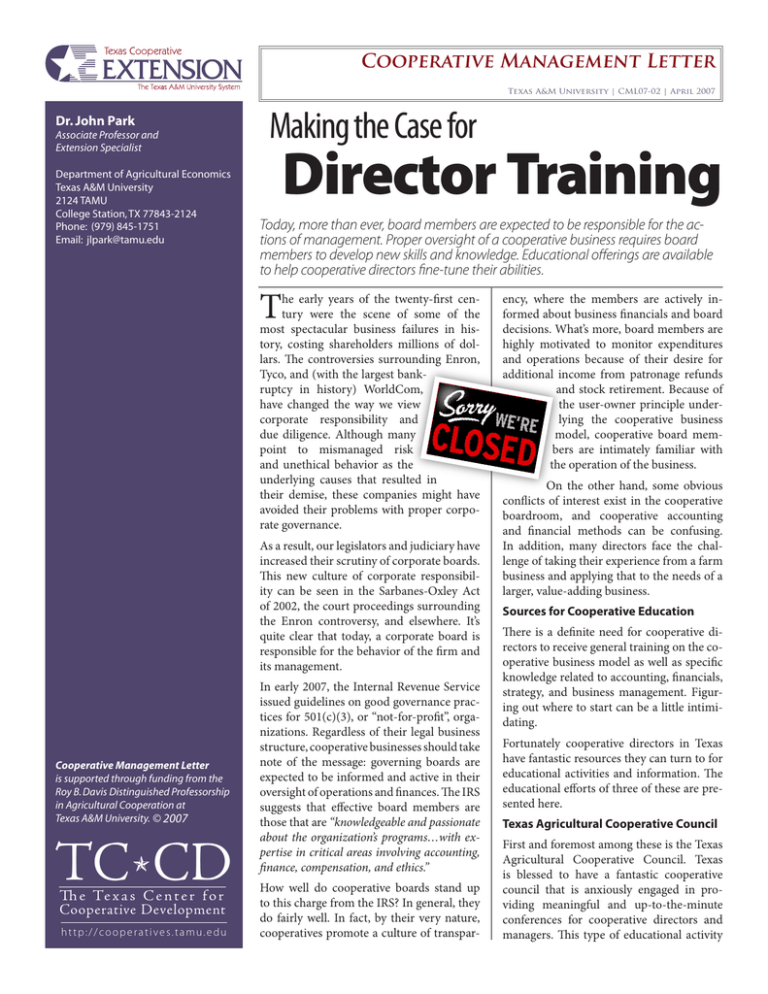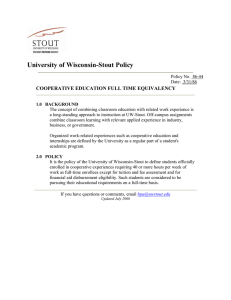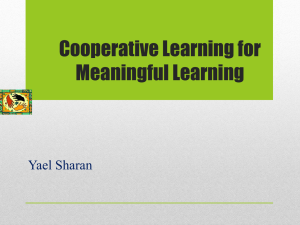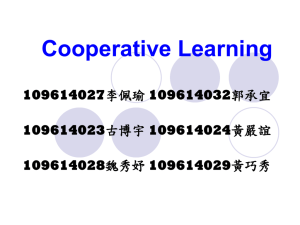Director Training Making the Case for
advertisement

Cooperative Management Letter Texas A&M University | CML07-02 | April 2007 Dr. John Park Associate Professor and Extension Specialist Department of Agricultural Economics Texas A&M University 2124 TAMU College Station, TX 77843-2124 Phone: (979) 845-1751 Email: jlpark@tamu.edu Making the Case for Director Training Today, more than ever, board members are expected to be responsible for the actions of management. Proper oversight of a cooperative business requires board members to develop new skills and knowledge. Educational offerings are available to help cooperative directors fine-tune their abilities. T he early years of the twenty-first century were the scene of some of the most spectacular business failures in history, costing shareholders millions of dollars. The controversies surrounding Enron, Tyco, and (with the largest bankruptcy in history) WorldCom, have changed the way we view corporate responsibility and due diligence. Although many point to mismanaged risk and unethical behavior as the underlying causes that resulted in their demise, these companies might have avoided their problems with proper corporate governance. As a result, our legislators and judiciary have increased their scrutiny of corporate boards. This new culture of corporate responsibility can be seen in the Sarbanes-Oxley Act of 2002, the court proceedings surrounding the Enron controversy, and elsewhere. It’s quite clear that today, a corporate board is responsible for the behavior of the firm and its management. Cooperative Management Letter is supported through funding from the Roy B. Davis Distinguished Professorship in Agricultural Cooperation at Texas A&M University. © 2007 TC CD Th e Te x a s C e n t e r f o r Cooperative Development http://cooperatives.tamu.edu In early 2007, the Internal Revenue Service issued guidelines on good governance practices for 501(c)(3), or “not-for-profit”, organizations. Regardless of their legal business structure, cooperative businesses should take note of the message: governing boards are expected to be informed and active in their oversight of operations and finances. The IRS suggests that effective board members are those that are “knowledgeable and passionate about the organization’s programs…with expertise in critical areas involving accounting, finance, compensation, and ethics.” How well do cooperative boards stand up to this charge from the IRS? In general, they do fairly well. In fact, by their very nature, cooperatives promote a culture of transpar- ency, where the members are actively informed about business financials and board decisions. What’s more, board members are highly motivated to monitor expenditures and operations because of their desire for additional income from patronage refunds and stock retirement. Because of the user-owner principle underlying the cooperative business model, cooperative board members are intimately familiar with the operation of the business. On the other hand, some obvious conflicts of interest exist in the cooperative boardroom, and cooperative accounting and financial methods can be confusing. In addition, many directors face the challenge of taking their experience from a farm business and applying that to the needs of a larger, value-adding business. Sources for Cooperative Education There is a definite need for cooperative directors to receive general training on the cooperative business model as well as specific knowledge related to accounting, financials, strategy, and business management. Figuring out where to start can be a little intimidating. Fortunately cooperative directors in Texas have fantastic resources they can turn to for educational activities and information. The educational efforts of three of these are presented here. Texas Agricultural Cooperative Council First and foremost among these is the Texas Agricultural Cooperative Council. Texas is blessed to have a fantastic cooperative council that is anxiously engaged in providing meaningful and up-to-the-minute conferences for cooperative directors and managers. This type of educational activity Cooperative Management Letter | April 2007 | is invaluable; there is no other activity that can replace face-to-face instruction from a knowledgeable, motivating speaker. Over time, TACC conferences have changed to accommodate the needs of growing cooperatives by covering more advanced topics and the latest industry trends. For this reason their programs have been highly successful and attract many repeat attendees. TACC offers other services to its members on an as needed basis for those who still have need of training in cooperative basics. Contact Features Texas Agricultural Cooperative Council 1210 San Antonio Street, Suite 101 Austin, TX 78701 Phone: (512) 450-0555 Email: coop@texas.coop http://www.mytacc.com/ • Top-rate educational conferences • Cutting-edge topics • Access to industry professionals • Some training on co-op basics Texas Center for Cooperative Development The educational strategy of the Texas Center for Cooperative Development is to complement the conferences of TACC in both form and content. Therefore, where the Cooperative Council is providing educational events that cover advanced business issues in a formal conference setting, the Center is providing educational opportunities that cover cooperative fundamentals through selfdirected products. In this way TACC and TCCD are partnering to provide directors with whatever content they need in both formal and informal settings. In addition to individualized presentations or consultations, TCCD provides two educational products: 1. The Cooperative Management Letter, and 2. The Director Development CD-ROM. The Cooperative Management Letter is published several times a year, and provides readers with short, thought provoking articles (you’re reading one now). The CD-ROM is a new product that presents an interactive, narrated lesson to the user complete with a test of knowledge. The software opens within an internet browser and is very simple to use. Cooperative directors that would like to document their completion of these 30 minute lessons may request a certificate from the Center. Both products are intended to be easily understood and used in a 20 minute sitting. Even seasoned directors may be surprised by the fresh perspective gained through use of these products. Contact Features Texas Center for Cooperative Development 2124 TAMU College Station, TX 77843-2124 Phone: (979) 845-1751 Email: cooperatives@ag.tamu.edu http://cooperatives.tamu.edu • Educational products on cooperative basics • Thought-provoking short articles • Informational presentations • Interactive CD-ROM series for self-instruction • Certification of completion is available USDA-Rural Development Finally, the Rural Development agency within the United States Department of Agriculture provides tremendous support dedicated to the success of cooperative businesses. In terms of education, USDA-Rural Development publishes Rural Cooperatives magazine six times per year. In addition, they host a vast library of informational bulletins, brochures, and research reports. All these products are available for free on their website. Contact Features Texas USDA-Rural Development 101 South Main Street, Suite 102 Temple, TX 76501 Phone: (254) 742-9780 http://www.rurdev.usda.gov/rbs/ • Vast library covering cooperative issues • Personal support for cooperative development • Grants supporting cooperative development Sharpen Your Axe Abraham Lincoln said “Give me six hours to chop down a tree and I will spend the first four sharpening the axe.” The same is true for director education. Proper director education requires a tremendous effort to be informed about market trends, to hone business skills, and to develop expertise. If you never stop to sharpen the axe, your efforts will become dull and ineffective. What’s more, you certainly wouldn’t sharpen your axe once and then never worry about it again. If we put this into the context managing your legal risk as a director, the concept of due diligence implies documented effort of the board to be actively engaged in the oversight of the business and ensuring the qualifications of board members to lead their organization effectively. Organization Educational Opportunity Type of Event Timing of Event Texas Agricultural Cooperative Council Director Development Program 1-Day Live Program September (Lubbock) February (Amarillo) Annual Meeting 3-Day Live Program March Board Chairman’s Conference 3-Day Live program July South Texas Cooperative Conference 2-Day Live Program October Director Development Series Interactive CD-ROM On Demand Cooperative Management Letter Topical Newsletter As Needed with Archive Online Cooperative Information Reports Documents Online Research Reports Documents Online Texas Center for Cooperative Development USDA-Rural Development Educational programs of Texas Cooperative Extension are open to all people without regard to race, color, sex, disability, religion, age, or national origin. Issued in furtherance of Cooperative Extension Work in Agriculture and Home Economics, Acts of Congress of May 8, 1914, as amended, and June 30, 1914, in cooperation with the United States Department of Agriculture, Edward Smith, Director, Texas Cooperative Extension, The Texas A&M University System.





